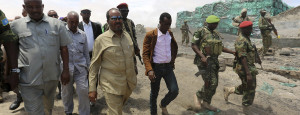Recent pushback against Al-Shabaab extremists and a partial easing of tensions between central and state governments have increased hopes for a stable democratic future in Somalia, as it continues to recover from the civil war of the 1990s and 2000s.
Nonetheless, Professor Ken Menkhaus of Davidson College—an expert on the country’s ongoing political transition—said much work was required to recapture momentum from the 2012 establishment of a new federal government, which brought in new political and security expertise, international support, and financial investment.“

Finishing a lot of transitional tasks left from the pre-2012 era is essential if the country is to move forward: to have a constitution; to have full elections,” he told International Peace Institute (IPI) Senior Adviser John Hirsch, at a recent IPI forum on 21st century peacebuilding.
“Since then, a number of things have not gone terribly well. We’ve seen a prolonged period of political paralysis in the government, with a lot of in-house fighting,”
Dr. Menkhaus said.He said the international community was deeply involved in Somalia, providing development and military aid, as well as applying pressure on the country’s leaders to continue their transitional tasks. This includes pushing for an election on a new head of state and a referendum on a new constitution, which had been expected next year.
This interview has been edited for clarity and length.
Could you comment on the extent to which the United Nations and the African Union mission in Somalia have been able to achieve their objectives there, and what the prospects are for the coming year?
The objectives have only been partially reached in Somalia, and in some ways that is not surprising. It has been a daunting task to rebuild a state that has failed for 25 years. There was a lot of optimism when the federal government of Somalia was declared in 2012, with new blood coming into the administration, a lot of international support, Al-Shabaab on its heels, and lots of reasons to be very excited about Somalia’s prospects. That drew a lot of Somali investment into the capital, which was an added value.
Since then, a number of things have not gone terribly well. We’ve seen a prolonged period of political paralysis in the government, with a lot of in-house fighting. This sometimes involves personalities and factions. Other times it has involved a debate that continues to plague the country, over the terms of federalism and the relationship between the central government and these emerging federal states. That has to be fixed.
Finishing a lot of transitional tasks left from the pre-2012 era is essential if the country is to move forward: to have a constitution; to have full elections. Not much progress has been made there. There have also been security setbacks: Al-Shabaab has regrouped and is now engaging almost exclusively in terrorist attacks against high-value targets. That has meant, in some cases, terrible casualties and a loss of confidence.
For all these reasons the situation is not quite as positive as we would have hoped, though there are some good pieces of news. AMISOM and the Somali security forces have continued to push Shabaab into more remote parts of the countryside in southern Somalia. We have also seen resolution of some of the tensions between federal states and the central government.
Could you say more about the strength of Al-Shabaab? What drives people toward it? What do you think the government and/or the international community needs to do, over and above a military action, to try to constrain it?
We really don’t know, because we can’t survey Shabaab supporters as to why and how many Somalis actively or passively support the organization. We do know that in some parts of southern Somalia they have been valued as a source of security and law and order. People miss that in some of the places where Shabaab has been pushed out, and they’ve actually found themselves in much less secure settings.We know that Shabaab has been very adept at exploiting local grievances, especially from marginalized social groups and clans; minority groups that feel that they’ve lost their land to more powerful clans or have not got a piece of the pie in the Mogadishu government.
The good news on that score is that it’s a political problem, not a military problem, and it can be solved by the government addressing those grievances. Again, the bad news is that the government hasn’t seemed to be up to addressing grievances or doing much of anything else lately.
Read more: Reigniting Somalia’s Political Transition: Q&A with Ken Menkhaus
Source: theglobalobservatory.org


